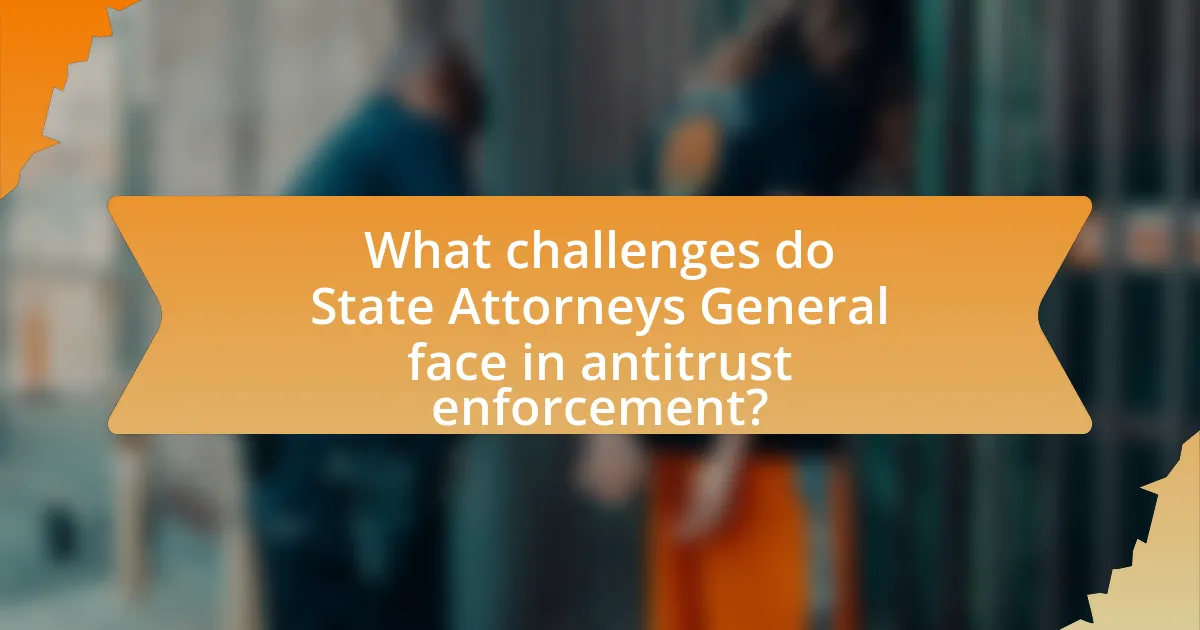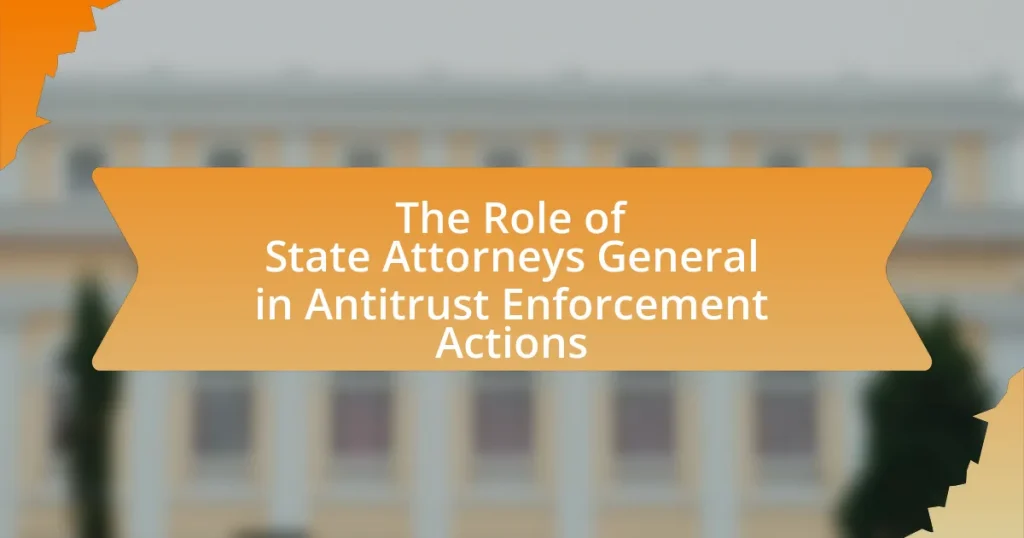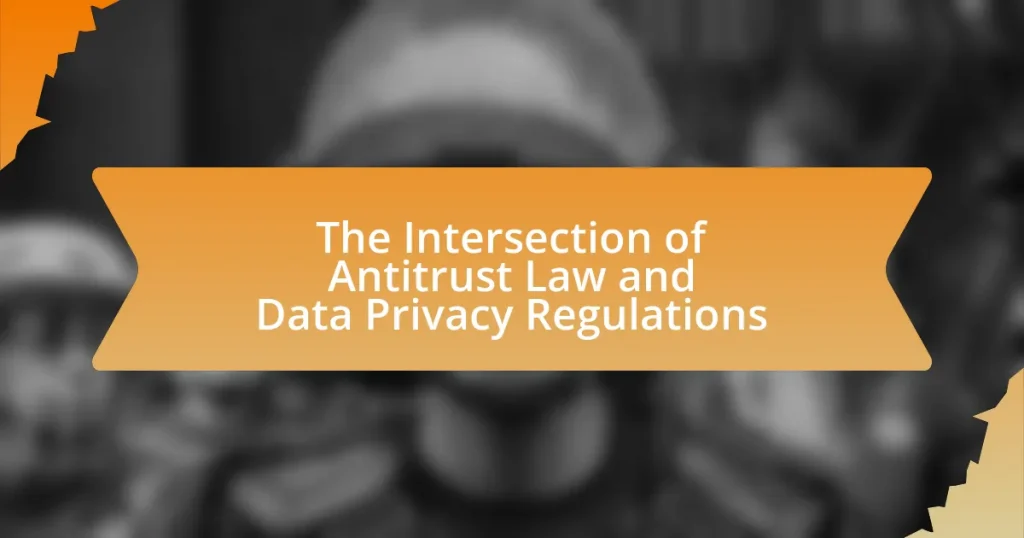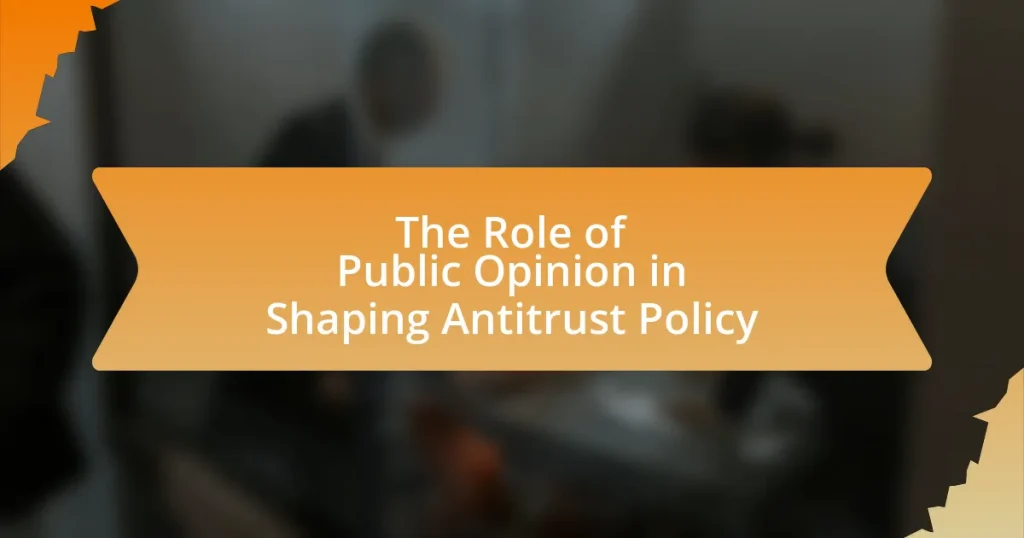State Attorneys General are pivotal in antitrust enforcement actions, tasked with investigating and prosecuting anti-competitive practices within their jurisdictions. They possess the authority to initiate lawsuits against companies violating state and federal antitrust laws, often collaborating with federal agencies such as the Department of Justice and the Federal Trade Commission. This article outlines the legal authority of State Attorneys General, their methods of collaboration, the types of antitrust violations they address, and the challenges they face in enforcement. Additionally, it highlights the importance of their localized insights and the strategies they employ to enhance their effectiveness in protecting consumer interests and promoting fair competition.

What is the Role of State Attorneys General in Antitrust Enforcement Actions?
State Attorneys General play a crucial role in antitrust enforcement actions by investigating and prosecuting anti-competitive practices within their jurisdictions. They have the authority to initiate lawsuits against companies that violate state and federal antitrust laws, often collaborating with federal agencies like the Department of Justice and the Federal Trade Commission. For instance, in 2020, a coalition of state attorneys general filed a lawsuit against Google, alleging anti-competitive behavior in the digital advertising market, demonstrating their active involvement in protecting consumer interests and promoting fair competition.
How do State Attorneys General participate in antitrust enforcement?
State Attorneys General participate in antitrust enforcement by investigating and prosecuting anti-competitive practices within their jurisdictions. They have the authority to initiate lawsuits against companies that violate state and federal antitrust laws, such as price-fixing or monopolistic behavior. For instance, in 2020, a coalition of State Attorneys General filed a lawsuit against Google, alleging anti-competitive practices in the digital advertising market. This demonstrates their active role in holding corporations accountable and protecting consumer interests.
What legal authority do State Attorneys General have in antitrust cases?
State Attorneys General have the legal authority to enforce both state and federal antitrust laws. This authority allows them to investigate and prosecute antitrust violations, such as price-fixing, monopolistic practices, and anti-competitive mergers. Under the Clayton Act, for instance, State Attorneys General can bring lawsuits to seek injunctions and damages on behalf of their states, reinforcing their role as key players in antitrust enforcement. Additionally, many states have their own antitrust statutes that empower these officials to take action independently of federal authorities, further enhancing their capacity to address anti-competitive behavior within their jurisdictions.
How do State Attorneys General collaborate with federal agencies in antitrust matters?
State Attorneys General collaborate with federal agencies in antitrust matters through joint investigations, sharing resources, and coordinating legal strategies. This collaboration often occurs in cases involving significant market power or anti-competitive practices that affect both state and federal interests. For instance, in high-profile cases like the 2020 lawsuit against Google, multiple state attorneys general worked alongside the Department of Justice to address concerns about monopolistic behavior, demonstrating a unified approach to enforcement. Such partnerships enhance the effectiveness of antitrust actions by combining state-level insights with federal authority, thereby increasing the likelihood of successful outcomes in complex cases.
Why is the involvement of State Attorneys General important in antitrust enforcement?
The involvement of State Attorneys General is crucial in antitrust enforcement because they provide localized oversight and can address anti-competitive practices that may not be adequately tackled at the federal level. State Attorneys General have the authority to initiate lawsuits, investigate anti-competitive behavior, and enforce state-specific antitrust laws, which can complement federal efforts. For instance, in 2020, a coalition of State Attorneys General successfully filed a lawsuit against Google for anti-competitive practices, demonstrating their ability to influence significant market dynamics and protect consumer interests. Their participation ensures that enforcement is more comprehensive and responsive to the unique economic conditions of each state.
What unique perspectives do State Attorneys General bring to antitrust cases?
State Attorneys General bring localized insights and a focus on consumer welfare to antitrust cases. Their unique perspectives stem from their understanding of state-specific economic conditions, consumer behaviors, and the impact of corporate practices on local markets. For instance, State Attorneys General can identify how monopolistic practices affect small businesses and consumers in their jurisdictions, which may differ from national trends. This localized knowledge allows them to tailor legal strategies that address specific harms, enhancing the effectiveness of antitrust enforcement. Additionally, they often collaborate with other states and federal agencies, amplifying their influence and resources in challenging anti-competitive behavior.
How does state-level enforcement complement federal antitrust efforts?
State-level enforcement complements federal antitrust efforts by allowing for localized scrutiny of anti-competitive practices that may not be adequately addressed at the federal level. State Attorneys General can pursue cases that reflect the specific economic conditions and consumer needs of their states, thereby filling gaps in federal enforcement. For instance, in 2020, a coalition of state attorneys general filed a lawsuit against Google, highlighting concerns about its dominance in the digital advertising market, which federal authorities had not prioritized. This collaboration enhances overall antitrust enforcement by leveraging state resources and expertise to address issues that may be overlooked, ensuring a more comprehensive approach to maintaining market competition.

What are the key functions of State Attorneys General in antitrust actions?
State Attorneys General play a crucial role in antitrust actions by enforcing state and federal antitrust laws to protect consumers and promote competition. They investigate potential antitrust violations, such as price-fixing or monopolistic practices, and can initiate lawsuits against companies that engage in anti-competitive behavior. For instance, in 2020, a coalition of State Attorneys General filed a lawsuit against Google for allegedly monopolizing the online advertising market, demonstrating their active involvement in maintaining market fairness. Additionally, State Attorneys General collaborate with federal agencies, such as the Department of Justice, to coordinate enforcement efforts and share resources, enhancing the effectiveness of antitrust enforcement across jurisdictions.
What types of antitrust violations do State Attorneys General address?
State Attorneys General address various types of antitrust violations, including price-fixing, bid-rigging, market allocation, and monopolistic practices. These violations disrupt fair competition and harm consumers by inflating prices or limiting choices. For instance, price-fixing involves agreements between competitors to set prices at a certain level, which is illegal under both state and federal antitrust laws. Bid-rigging occurs when competitors collude to manipulate the bidding process, undermining the integrity of competitive bidding. Market allocation involves agreements among competitors to divide markets or customers, which restricts competition. Monopolistic practices, such as predatory pricing or exclusive dealing, can also be targeted by State Attorneys General to ensure a competitive marketplace.
How do State Attorneys General investigate antitrust violations?
State Attorneys General investigate antitrust violations by conducting thorough inquiries that may include gathering evidence, interviewing witnesses, and analyzing market practices. They utilize their authority to issue subpoenas for documents and compel testimony from businesses and individuals suspected of anti-competitive behavior. Additionally, State Attorneys General often collaborate with federal agencies, such as the Federal Trade Commission, to share information and resources, enhancing the effectiveness of their investigations. This collaborative approach is supported by the fact that many antitrust cases involve complex economic analyses and require a comprehensive understanding of market dynamics.
What remedies can State Attorneys General seek in antitrust cases?
State Attorneys General can seek various remedies in antitrust cases, including injunctive relief, monetary damages, and civil penalties. Injunctive relief aims to prevent ongoing or future anticompetitive conduct, while monetary damages can compensate for losses incurred due to antitrust violations. Civil penalties serve as a deterrent against unlawful practices. These remedies are supported by state laws that empower Attorneys General to enforce antitrust statutes and protect consumer interests. For instance, under the Sherman Act and state antitrust laws, Attorneys General can initiate lawsuits to address anti-competitive behavior effectively.
How do State Attorneys General prioritize antitrust enforcement actions?
State Attorneys General prioritize antitrust enforcement actions based on the potential impact on consumers, market competition, and the severity of the antitrust violation. They assess cases that could lead to significant consumer harm or unfair market practices, often focusing on industries where monopolistic behavior is prevalent, such as technology and healthcare. For instance, in 2020, a coalition of State Attorneys General filed a lawsuit against Google, citing concerns over its dominance in online advertising, which they argued stifled competition and harmed consumers. This prioritization reflects a strategic approach to address the most pressing antitrust issues within their jurisdictions.
What factors influence the selection of cases by State Attorneys General?
State Attorneys General select cases based on several key factors, including the potential impact on consumers, the strength of the evidence, and the alignment with state priorities. The potential impact on consumers is crucial, as cases that can significantly benefit the public or address widespread harm are prioritized. The strength of the evidence is also vital; cases with robust legal grounds and clear violations of antitrust laws are more likely to be pursued. Additionally, alignment with state priorities ensures that the cases reflect the interests and needs of the state’s residents, which can vary based on local economic conditions and political climates. These factors collectively guide State Attorneys General in their decision-making process regarding case selection.
How do public interests shape the enforcement priorities of State Attorneys General?
Public interests significantly shape the enforcement priorities of State Attorneys General by guiding their focus on issues that directly affect the welfare of their constituents. State Attorneys General prioritize cases that address consumer protection, public health, and economic fairness, reflecting the concerns and needs of the public. For instance, in recent years, many State Attorneys General have taken action against large corporations for practices deemed harmful to consumers, such as price-fixing or deceptive advertising, which aligns with public demand for accountability and transparency. This alignment is evident in the increased number of antitrust actions initiated by State Attorneys General, as they respond to public outcry regarding monopolistic practices that threaten competition and consumer choice.

What challenges do State Attorneys General face in antitrust enforcement?
State Attorneys General face significant challenges in antitrust enforcement, primarily due to limited resources, varying state laws, and the complexity of proving antitrust violations. Limited financial and personnel resources hinder their ability to conduct extensive investigations and litigation compared to large corporations that can afford extensive legal teams. Additionally, the diversity of state laws regarding antitrust issues creates inconsistencies in enforcement, complicating multi-state actions. The complexity of antitrust law itself, which requires demonstrating anti-competitive behavior and its impact on consumers, further complicates their efforts. These challenges collectively impede the effectiveness of State Attorneys General in addressing antitrust violations.
How do resource limitations impact antitrust enforcement by State Attorneys General?
Resource limitations significantly hinder antitrust enforcement by State Attorneys General. These limitations often result in insufficient funding, which restricts the ability to conduct thorough investigations, hire expert staff, and engage in extensive litigation. For instance, a report from the National Association of Attorneys General indicates that many state offices operate with budgets that are a fraction of those available to federal agencies, leading to fewer resources for pursuing complex antitrust cases. Consequently, this disparity can result in a lower number of cases being brought forward and a reliance on federal enforcement, which may not address all antitrust violations at the state level.
What strategies can State Attorneys General employ to overcome resource constraints?
State Attorneys General can employ collaborative partnerships and innovative funding strategies to overcome resource constraints. By forming coalitions with other states, Attorneys General can share resources, expertise, and costs associated with antitrust investigations and litigation. For instance, the Multistate Antitrust Task Force allows states to pool their resources for larger cases, enhancing their capacity to take on significant antitrust issues. Additionally, seeking external funding through grants or federal assistance can provide necessary financial support for investigations. Research indicates that states that collaborate on antitrust enforcement can achieve more impactful outcomes, as seen in cases like the 2020 multistate lawsuit against Google, where shared resources led to a comprehensive legal strategy.
How do political considerations affect antitrust enforcement actions?
Political considerations significantly influence antitrust enforcement actions by shaping the priorities and strategies of state attorneys general. These officials often align their enforcement efforts with the political climate, responding to public sentiment and the interests of constituents. For instance, during periods of heightened concern over corporate monopolies, state attorneys general may intensify investigations and lawsuits against large corporations to demonstrate responsiveness to voter concerns. Historical examples include the 1998 antitrust case against Microsoft, where political pressure played a role in the aggressive pursuit of the case by various state attorneys general. Additionally, political affiliations can affect the willingness to pursue certain cases; Democratic attorneys general may focus more on consumer protection and corporate accountability, while Republican counterparts might emphasize deregulation and business interests. This dynamic illustrates how political contexts can dictate the focus and intensity of antitrust enforcement actions.
What legal and procedural hurdles do State Attorneys General encounter?
State Attorneys General encounter several legal and procedural hurdles, including jurisdictional limitations, resource constraints, and the need to navigate complex federal and state laws. Jurisdictional limitations can restrict their ability to pursue cases that cross state lines or involve federal regulations, as seen in cases like the 2018 antitrust lawsuit against Google, where states had to coordinate their efforts. Resource constraints often hinder their capacity to conduct thorough investigations and litigation, as many state offices operate with limited budgets and staff compared to federal agencies. Additionally, the procedural complexities of antitrust laws require State Attorneys General to possess specialized knowledge and expertise, which can be a barrier to effective enforcement.
How do jurisdictional issues complicate antitrust enforcement?
Jurisdictional issues complicate antitrust enforcement by creating challenges in determining which legal authority has the power to investigate and prosecute antitrust violations. Different states may have varying antitrust laws and enforcement mechanisms, leading to inconsistencies in how cases are handled. For example, a company operating in multiple states may face different legal standards and interpretations of antitrust laws, complicating compliance and enforcement efforts. Additionally, jurisdictional disputes can arise between state and federal authorities, as seen in cases where state attorneys general pursue actions that overlap with federal investigations, potentially leading to conflicting outcomes and resource allocation challenges.
What role do courts play in shaping the actions of State Attorneys General in antitrust cases?
Courts play a critical role in shaping the actions of State Attorneys General in antitrust cases by interpreting laws and setting legal precedents that guide enforcement strategies. When courts adjudicate antitrust cases, their rulings clarify the application of antitrust laws, such as the Sherman Act and the Clayton Act, which State Attorneys General rely on to formulate their legal arguments and strategies. For instance, landmark decisions like United States v. Microsoft Corp. established important legal standards regarding monopolistic practices, influencing how State Attorneys General approach similar cases. Additionally, court decisions can either validate or challenge the actions taken by State Attorneys General, thereby impacting their willingness to pursue certain cases or adopt specific legal theories in future enforcement actions.
What best practices can enhance the effectiveness of State Attorneys General in antitrust enforcement?
State Attorneys General can enhance their effectiveness in antitrust enforcement by fostering collaboration with federal agencies, leveraging data analytics, and engaging in public education initiatives. Collaboration with federal agencies, such as the Federal Trade Commission and the Department of Justice, allows for resource sharing and coordinated efforts in complex cases, as evidenced by the successful joint actions taken in high-profile antitrust cases like the Google and Facebook investigations. Utilizing data analytics enables State Attorneys General to identify anti-competitive practices more efficiently, as demonstrated by states employing advanced algorithms to analyze market trends and consumer behavior. Additionally, public education initiatives raise awareness about antitrust issues, empowering consumers to report anti-competitive behavior, which can lead to more effective enforcement actions. These best practices collectively strengthen the role of State Attorneys General in safeguarding market competition.
How can collaboration with other states improve antitrust enforcement outcomes?
Collaboration with other states can significantly enhance antitrust enforcement outcomes by pooling resources, expertise, and information. When state attorneys general work together, they can share investigative findings, coordinate legal strategies, and amplify their collective bargaining power against large corporations. For instance, the multi-state lawsuit against Google in 2020 involved 38 states, which allowed for a more comprehensive approach to addressing antitrust concerns, leveraging the diverse legal frameworks and consumer protection laws of each state. This collaboration not only increases the likelihood of successful litigation but also fosters a unified front that can deter anti-competitive behavior more effectively than isolated actions.
What tools and resources are available to support State Attorneys General in their efforts?
State Attorneys General have access to various tools and resources to support their efforts in antitrust enforcement actions. These include legal frameworks such as the Sherman Act and the Clayton Act, which provide the authority to investigate and prosecute antitrust violations. Additionally, they can utilize data analytics tools to assess market conditions and identify anti-competitive practices. Collaboration with federal agencies, such as the Federal Trade Commission, enhances their investigative capabilities. Furthermore, organizations like the National Association of Attorneys General offer training, resources, and networking opportunities to strengthen their enforcement strategies. These resources collectively empower State Attorneys General to effectively address antitrust issues within their jurisdictions.



